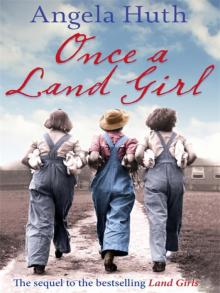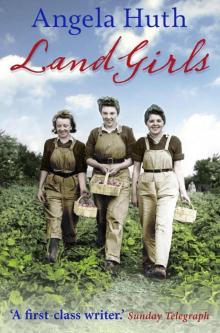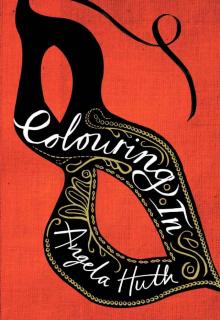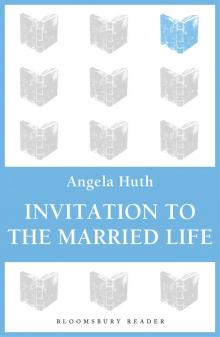- Home
- Angela Huth
Of Love and Slaughter
Of Love and Slaughter Read online
Of Love and Slaughter
ANGELA HUTH
‘Ill fares the land, to hast’ning ills a prey … ’
‘The Deserted Village’, Oliver Goldsmith
Contents
George
Lily
Part One
01
02
03
04
05
06
07
08
Part Two
09
10
11
12
13
14
15
16
17
MAFF Ministry of Agriculture, Fisheries and Food
DEFRA Department of Environment, Food and Rural affairs
CAP Common Agricultural Policy
IACS Integrated Administration and Control System
NFU National Farmers’ Union
George
I can’t ever remember exactly how we came to be sitting on a bank of the river, some miles from Oxford, on an April day shortly after the end of term. With finals not far off, I was staying in college for a week of the vacation, concentrated study being so much easier there than at home. I suppose Lily had the same plan in mind, though I didn’t ask her.
Sometimes I try hard to recall details, but they elude me. Perhaps because, at the time, they were of no importance. I hardly knew Lily. She was at the Ruskin, I was at Trinity. Our paths rarely crossed. I’d occasionally see her at a party. We’d exchange a few words, nod, smile. She always seemed to be at the centre of some vivacious swirl of friends of which I was no part. Had I been drawn to her perhaps I should have made some bold effort, jostled my way through the crowd to spend more than two minutes at her side. But I wasn’t drawn to her. I never thought about her. The placid Serena was my girlfriend: undemanding, accommodating, good-humoured. We had the sort of arrangement that’s convenient at university: doesn’t tie you down, no thoughts of permanency, but nice to fall back on. I was quite happy with Serena.
I do know that on this particular day it was in the Broad Lily and I met. She was ruffled by a breeze, carrying two plastic bags of food from the market. She wore that expression, somewhere between pain and outrage, common to women who have to transport heavy shopping. Naturally I offered to help. I had no definite plans for the rest of the morning.
It seemed Lily knew I was the owner of a car. (How did she know that? In our brief exchanges, mentioning that I had an old Ford Escort was simply not the sort of thing that would have occurred to me. Very puzzling, but I didn’t think much about it.) ‘In that case,’ she said, ‘you could give me a lift to somewhere on the river. I want to think,’ she said, ‘and there are no convenient buses.’
I concurred with neither pleasure nor irritation – rather, with the simple acceptance of a man being given an order. In the car I must have followed her directions, asking no questions. We ended up somewhere near Bablock Hithe. ‘Arnold’s stripling Thames,’ she said. I think I smiled and nodded, not knowing the reference, though I looked it up years later.
We sat on the grass in a foursome with the plastic bags. I can’t remember what kind of sky there was – bright, I think – but the grass was dry. An almost transparent sensation of early green was flung across the landscape, of the kind that precedes the brightness of May. I do remember suggesting I should leave so that Lily could think in peace, but she seemed to have changed her mind about her desire for solitude. She pointed out that if I left she would have no way of getting back, so I’d better stay.
We ate a few things from the bags – fruit, biscuits – and shared a bottle of very sweet apple juice. Lily talked almost without cease. I only half listened, as one does to birdsong – perhaps the reason I remember so little of what she said. I learnt that she was in some confusion over her future: should she be an art historian, a teacher, an art critic? Her aim in life was to teach people to look, to see. Here she became very emphatic, fiercely screwing up a small paper bag in her hand. She had learnt from her father that most people don’t use their eyes, thus missing so much of what the world, and art, had to offer. I think I had become rather drowsy at that point, though was returned to full alertness by a piercing shriek. ‘Look!’ she suddenly shouted, clutching at me. She fanned her arm across sky, trees, meadows, river. I was unsure which of these things she was intent on my looking at most, so nodded in a general, affable way. She then accused me of plainly not being a man interested in really looking, and how disappointing that was. But then most men were disappointing, she added.
Soon after that we returned to the car and I drove her back to Oxford. Despite the disappointment I had caused her she didn’t seem affronted. We sat in easy silence and I dropped her off – where? That’s one of the things that has puzzled me for years. I have no picture in my mind of her getting out of the car, though I imagine she must have thanked me. I’m sure we made none of those silly, meaningless plans to meet again. I don’t remember seeing her walk away, or even what she was wearing, though a flash of blue comes to mind. A scarf, perhaps.
Our last term at Oxford I saw her in the distance at a Commem. Ball. She looked with more interest at Serena that she did at me and we did not speak. Then I became submerged in the next part of life: my training as a lawyer. Lily was an insignificant detail in a time that was past, and I did not think about her again.
Lily
I remember precisely. Desmond had been more irritating than usual that morning, trying to pin me down to promises for the future. Trying to hem me in, as always. I’d spend the night with him in his grand rooms in New College: always a mistake, because the next morning he judged he’d gained on me. Scored another notch of my affection. He put great faith in the seductive qualities of his rooms: huge windows looking on to the chapel, the sound of the choir practising – that’ll get her, he seemed to think. Of course it didn’t. I couldn’t be moved by Desmond in the most beautiful place on earth, and was annoyed by myself when I gave in to him. But it wasn’t always easy to find the energy to fight him, make excuses. Guilt forced me to be not too unkind when I looked at his stricken face. Desmond was an unwise fixture. I’d become involved with him by mistake, flattered by his attentions but knowing he absolutely wasn’t the right man for me. I’d had much more fun when I was a freelance, flirting with lots of people, accountable to no one. Still, there was only one more term, then he’d be off to Harvard Business School. It would come to a natural end. I’d resolved to try to be my nicest for the few remaining weeks, but it was hard.
That particular morning I had stomped out, not saying where I was going. I had a cup of coffee in the market, to calm myself down, and thought I’d like to go down to the river, the place of childhood picnics, to think in peace. Hopeless idea, I knew, as there was no way of getting there. Downcast, I set off for my rooms in Jericho, determined to unplug the telephone.
My luck changed when I ran into George Elkin in the Broad. He was ambling along, his usual vague expression indicating he was preoccupied by thoughts far from the present. I didn’t know him well. We were what’s called nodding acquaintances, but he always seemed agreeable, harmless. Not the sort of man you’d want to make a particular effort to befriend, but I was happy enough to exchange the time of day. He was known to have a rather dull girlfriend, Serena. You could have guessed her name from a mile off.
I knew George had a car. Desmond had once seen him stalling at some traffic lights. Pathetic, Desmond had reported. He himself, in his MG, regarded a quick getaway at a green light as something to be proud of. It was one of the things I disliked about him.
Anyway, I interrupted George’s daydream with a suggestion of a spontaneous picnic by the river. He looked a little s
tartled, but agreed at once. I guided him patiently – it was true, he was a pretty hopeless driver, hesitant. I guessed at once he was probably hesitant in life in general. Serena must have been very patient.
We chose a place – at least, I chose a place – on the river bank where the grass was short and dry. It was an overcast day, solid cloud reflected brownly in the river. There was a swan nearby, pinned to the still water like a brooch. George made no comment about the bird. People usually make some mundane observation on seeing a swan. I rather warmed to him for that. I thought it said much about him.
I warmed to him even further when I passed him the bottle of apple juice, having drunk myself, and he put it to his mouth without hesitation. Desmond would have gone through all the palaver of wiping it with his ironed handkerchief, even though we were lovers.
George was very quiet, hardly spoke. I babbled on about my future, the sort of thing that bored Desmond, who scorned those who did not have a detailed life-plan. George didn’t come up with any helpful suggestions, but he looked sympathetic. I forgot to ask what his plans were when he came down. I suppose I wasn’t that interested. Then somehow I got on to my favourite subject of people not looking at things, and how my passion in life was to encourage real, conscious observation all the time. Here, George indicated slight bewilderment but gave a small laugh of, I think, agreement. I was suddenly very anxious to push him further, try him out. So I shouted to him to look – at everything, I meant. Tell me what he could see. But here I lost him. He was completely bemused. And again I found myself approving his reaction to my demand, not immediately obeying me and then coming up with silly questions. I wanted to tell him that if he really looked he would see that the little piece of earth before us could be a significant piece of the jigsaw of our memories. When we were old, and had forgotten each other’s names, we would still remember the unique moment when sky, river, meadow and swan made a kind of harmony in the soul. But I decided not to. I didn’t think he’d understand, and I couldn’t be bothered to explain.
On the way back in the car we talked about avocado pears (the difficulty of finding the perfect one) and our sadness at the ugly development of Oxford. We agreed it was lucky we were leaving before things became much worse.
He dropped me outside my lodgings in Jericho. I wished him well in his finals (mention of them caused him to look a little nervous) and kissed him on the cheek by way of thanks. Our parting was completely unmemorable. He drove off with a small wave in his stuttery old car and I hoisted the bags – lighter, now – through the front door. I remember thinking how much easier he was to be with than Desmond. Uncritical. Desmond had criticised me for something or other at our first meeting, though later he declared he had been teasing. Also, there was no denying George’s profile was in every way superior to Desmond’s: a fine Roman nose, he had, and prematurely old but appealing lines crowded his eyes when he smiled. But I felt no desire to seek George out in our last term, or see him again. He’d been a kind chauffeur, that’s all. I didn’t think about him again for some years.
Part One
1
When George was nine years old, not long after his mother had died, he was taken to see his father’s office. ‘By way of a treat, old son,’ David Elkin said.
George was driven from the farm to the city by Silvia Dust, a local girl employed to look after him. Out of his father’s hearing George called her Dusty: in his father’s presence he remembered to call her Silvia, for his father hated nicknames, abbreviations of any kind. Dusty, like her charge, was in some doubt as to how much fun this visit to the office would be. But at least tea was promised afterwards in a place near the cathedral known for its home-made ice cream.
George found the wooden stairs leading to the first floor of the old building were even steeper than the stairs at the farm. He imagined they would cause his father to puff and splutter and pause for breath, just as he did at home, and felt sorry for him. If the right moment came, during the conversation in the office, he would suggest a lift might be a good idea.
At the top of the first flight they came to the door of Elkin, Anderson and Pease, Solicitors. The names were engraved in old-fashioned writing on a brass plaque. George thought it was rather funny, seeing his name on a door. But not funny enough to smile. ‘Chin up,’ said Dusty, and rang the bell.
The door was opened by a woman George supposed was Rosemary Hollow, his father’s secretary. He had heard a lot about her. His father was always saying what a treasure she was, though occasionally he hinted that he found her just a little annoying. Apparently she was always mislaying things. Sometimes she even sent the wrong letter to the wrong client, and her spelling wasn’t tip-top. But there was no question of ever changing her for a more efficient model. The office wouldn’t be the same without her, David Elkin said.
Hollow (as her boss called her in the office) gave George and Dusty a smile that looked as if it wasn’t often called upon. George’s eyes moved down to her chest. The very complicated Fair Isle pattern of her jersey, in raw bright colours, made him dizzy. He felt for Dusty’s hand.
In the waiting room, where Miss Hollow urged them to make themselves at home for a few moments, George could see why she mislaid things so often. Papers and files were piled up on the floor, squashed into shelves, even balanced on the seats of upright chairs. Of course it wouldn’t be easy to find anything in this muddle. George felt sorry for Miss Hollow. He could hear her, or someone, tapping away at a typewriter in another room – a soft, sad, spongy noise in the silence. George swung his legs. He hadn’t expected his father’s office to be a bit like this. He hadn’t expected the strong smell of tea and smoke, which reminded him of the station waiting room. And it was very peculiar, considering his father made such a fuss about being on time, that they were now kept waiting.
When at last they were shown into Mr Elkin’s office there was another surprise: George saw that his father appeared oddly small. Perhaps it was because of the huge size of the desk, or because he was huddled, shoulders hunched, into a curved armchair that swung from side to side. He didn’t look at all like the tall man George was used to seeing raking up straw, or driving the tractor. Also, he was wearing a dark suit and a dull tie – clothes George scarcely saw in the early morning when Mr Elkin, in an old army overcoat, drove him to school. Altogether, he looked older, strange. George held on to the wooden arms of the chair his father had told him to sit in, on the opposite side of the desk. And what a piece of furniture that was. Black wood, unshining. There was a leather blotter with pink blotting paper unmarked by any splodge of blue, an ivory paper cutter, a fountain pen and a bottle of Stephen’s ink. Not a paper or file. The telephone, placed well out of Mr Elkin’s reach, sat in a nest of muddled brown cord. Such a waste of space, George thought. He would have liked to have something this size for his trains.
‘Well, my son, what do you think?’
George swung his legs again. He didn’t think anything much except that he didn’t like the strong smell of cigar. Sometimes, when his mother was alive, people used to come to dinner. When he passed the open dining-room door next morning, the same smell jumped out at him. But when he came home after lunch it was gone. His mother was a great one for opening windows. Here, perhaps the one window, behind his father, was never opened.
‘Welcome to Elkin, Anderson and Pease,’ Mr Elkin added. ‘Your future, if you’ve any sense.’
George wished Dusty was at his side. He wanted to hold her hand, but she had been ordered by Miss Hollow to take a seat at the back of the room. He raised his head and looked his father in the eye as he was so often bidden to do. No immediate response to the welcome, and threat, came to mind. Through the window he could see the sky was a brownish colour with no clouds. The spire of the cathedral and the bare branches of a single tree were the only things to pattern the brown. He hoped very much there would be no time, when the visit was over, to see something of interest in the cathedral. He had been once to a very long and boring serv
ice which his father had declared was magnificent. He hadn’t liked to disagree but didn’t want to go again.
Something came to him.
‘Where do Mr Anderson and Mr Pease work?’ he asked.
His father chuckled. ‘Bill Anderson’s office is down the corridor, looks over the back. Nice enough. But obviously, as the senior partner, I get the biggest room.’
George took this in.
‘And Mr Pease?’
‘Henry Pease died years ago. He had the top floor. Low ceilings but the best view. Marvellous legal mind but always had a weak chest, poor Henry. We keep his name for balance. Rhythm. You appreciate my meaning, George? Elkin, Anderson and Pease has a certain gravitas, you must agree, that plain Elkin and Anderson would lack.’
George nodded. It was always best to agree with the many hard-to-understand things that his father said, mostly to do with rhythm. His father was always on about that. ‘This desk would be a good place to play with my trains,’ he added, aware it was his turn to speak again.
‘So it would.’ Mr Elkin gave one of his quick smiles, like the ones he gave the farm manager when there was good news about milk yields or the market price of sheep. ‘It’s called a partners’ desk. In the old days two partners of the firm would sit one at each side.’
‘That wouldn’t be so lonely.’
‘No.’ Mr Elkin flashed his son a pensive look. ‘But we like our own offices, a desk to ourselves these days. Well, I’ve got to get back to work. Hollow and Silvia will take you out to tea. Any questions before you go?’
George wondered what his father would do at the empty desk once Dusty and he had gone, but decided it was best not to ask. He shook his head, slipped off his chair. When his father, too, stood up he looked more ordinary again. He came round to where George stood, by now next to Dusty, hand in hers, and ruffled his hand through his son’s hair.

 Sun Child
Sun Child South of the Lights
South of the Lights Virginia Fly is Drowning
Virginia Fly is Drowning Of Love and Slaughter
Of Love and Slaughter Such Visitors
Such Visitors Once a Land Girl
Once a Land Girl Land Girls
Land Girls Colouring In
Colouring In Nowhere Girl
Nowhere Girl Monday Lunch in Fairyland and Other Stories
Monday Lunch in Fairyland and Other Stories Another Kind of Cinderella and Other Stories
Another Kind of Cinderella and Other Stories Invitation to the Married Life
Invitation to the Married Life Easy Silence
Easy Silence